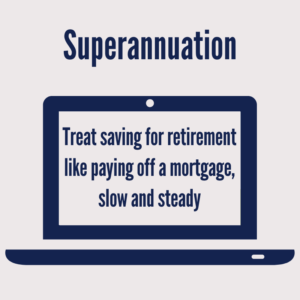As a small business owner I doubt you are rolling in large amounts of spare cash but I presume that eventually you’ll want to retire or go part-time to enjoy your golden years. And what will you need to do that? Superannuation or a retirement fund/plan.
I know superannuation sounds like something only old people need to worry about BUT the longer your money has to grow the larger the sum is likely to become AND contributions can be tax deductible, even for sole traders.
What is it?
Superannuation is your investment in your retirement and it is taxed at a lower rate than your regular income (which is where the deductibility starts).
I’m sure we all know the statutory figure for employees is 9.5% but what about self-employed? Well there is no requirement, but don’t let a lack of legislation ruin your retirement.
How much do you need?
According to Scott Pape, the Barefoot Investor, he shunned the rumoured you need a $1m to retire and instead puts the figure at a more achievable sounding $250k for couples or $170k for individuals PLUS a mortgage free home. With this plan you’d likely benefit from the old age pension and be able to take home around $60k a year for couple or $35k a year for individuals.
Where you choose to make your home will impact how much that is worth and how long it may take to pay off. But saving for superannuation should be treated the same as paying off a mortgage, slow and steady (unless the interest rate goes crazy high).
A balanced portfolio isn’t a mortgage free home, no cash, no personal investments and no superannuation. You want to minimise risk by having a balance of different investment types.
When should you contribute?
You want to contribute to each of these steadily to make the most of the magic of compounding. $10,000 invested in the Australian stock exchange could be worth almost $150,000 in 2019. That’s just a one-off investment, imagine if you regularly contributed to that initial $10k.
The same applies to superannuation with average returns over the long term of 7% but they also benefit from lower tax so you can put in a bit more. But individual years’ performance varied from -12% to +15% so if you’d put a lump sum you could be very happy or very disappointed.
Tax Deductibility
As a sole trader you aren’t paid a salary, or have compulsory superannuation paid by an employee so anything you pay into your superannuation is classed as a personal contribution paid out of your after-tax income. Why after tax? Well superannuation isn’t a business expense for tax purposes so when you pay tax on your business profit anything paid to super is included as profit. Instead of claiming it as a business expense you deal with it as part of the personal section of your tax return. Your superannuation fund should automatically identify any personal contributions, you inform them you will be claiming a tax concession for your contributions and they must acknowledge BEFORE you submit your personal tax return. Then you’re able to claim a concession for the difference between your personal income tax rate and the lower superannuation tax rate (15%) IF your marginal tax rate is higher.
More information on this from the ATO website
Watch
Pin for Later


